Polycystic ovary syndrome (PCOS) affects millions of women worldwide, causing a range of frustrating symptoms because of hormonal imbalances. While conventional treatments exist, many women are turning to herbal supplements as a natural approach to managing their PCOS.
Let’s explore the top 10 herbal supplements that show promise in alleviating PCOS symptoms and improving overall well-being.
Understanding PCOS
PCOS is characterized by hormonal imbalances, particularly an excess of androgens (male hormones) and insulin resistance. These imbalances can lead to irregular menstrual cycles, difficulty conceiving, excess hair growth (hirsutism), acne, weight gain, mood swings, and fatigue.
The impact of PCOS extends beyond physical symptoms. Many women with PCOS struggle with self-esteem issues, anxiety, and depression.
The chronic nature of the condition can also increase the risk of long-term health problems such as type 2 diabetes, cardiovascular disease, and endometrial cancer.
Now, let’s dive into the herbal supplements that may help manage these symptoms.
1. Cinnamon
Cinnamon is more than just a delicious spice, it’s a powerful ally in managing PCOS symptoms. Research shows that cinnamon can improve insulin sensitivity and regulate blood sugar levels, which is crucial for women with PCOS who often struggle with insulin resistance.
A study published in the Journal of Endocrinology and Metabolism found that women with PCOS who took cinnamon supplements daily for eight weeks experienced significant improvements in insulin sensitivity compared to those who took a placebo.
How to use cinnamon:
- Add a teaspoon to your morning oatmeal, smoothies, or coffee
- Take cinnamon supplements (choose Ceylon cinnamon, also known as “true” cinnamon)
- Sprinkle it on yogurt or fruit for a tasty, PCOS-friendly snack
Consistency is key when using cinnamon for PCOS management. Make it a daily habit, and you may start noticing improvements in your blood sugar levels and overall PCOS symptoms.
>>Try this product from Amazon<<
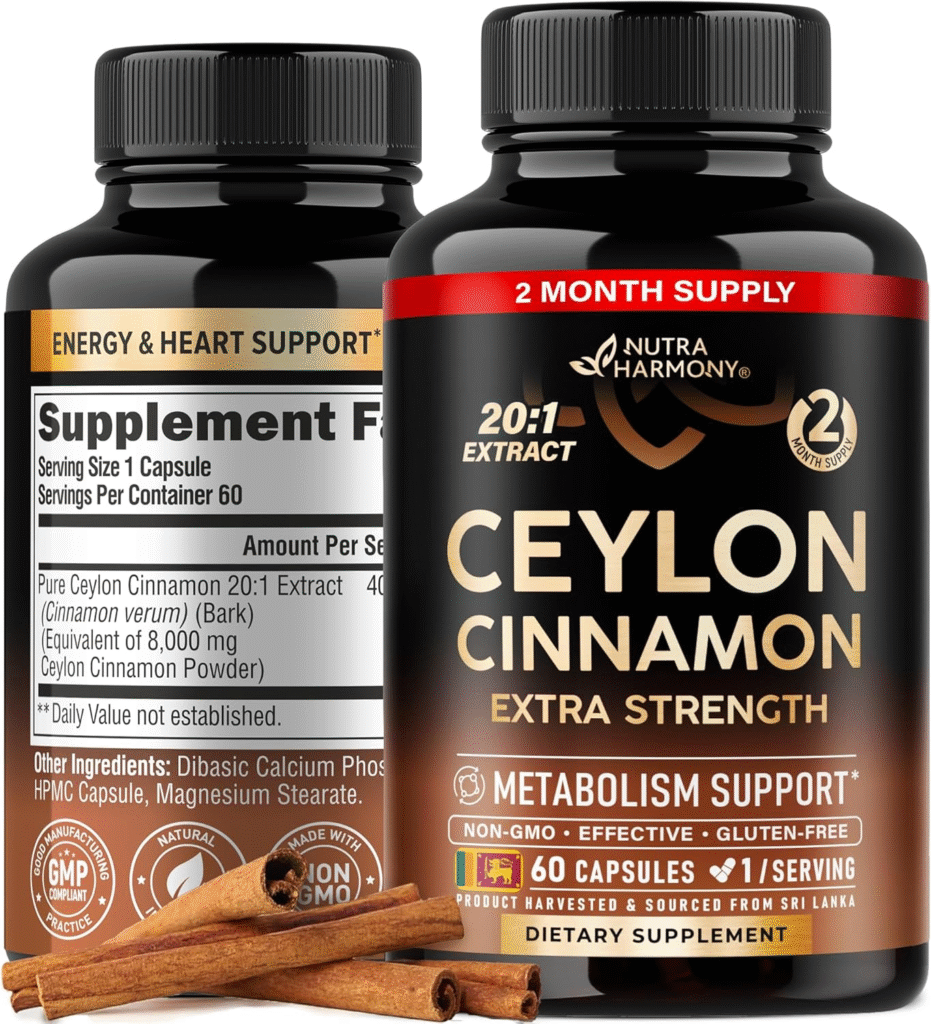
2. Spearmint
Spearmint tea has gained popularity among women with PCOS because of its potential anti-androgenic effects. Studies have shown that drinking spearmint tea twice daily can help reduce excess hair growth and improve hormonal profiles in women with PCOS.
A randomized controlled trial published in Phytotherapy Research found that women who drank two cups of spearmint tea daily for 30 days had significantly lower free and total testosterone levels compared to those who drank a placebo tea.
How to incorporate spearmint:
- Drink a cup of spearmint tea in the morning and evening
- Add fresh spearmint leaves to your water or smoothies
- Use spearmint essential oil in a diffuser for aromatherapy benefits
Spearmint’s refreshing taste makes it an easy and enjoyable addition to your PCOS management routine. Plus, it’s caffeine-free, making it a great option for those looking to reduce their caffeine intake.
>>Try this product from Amazon<<
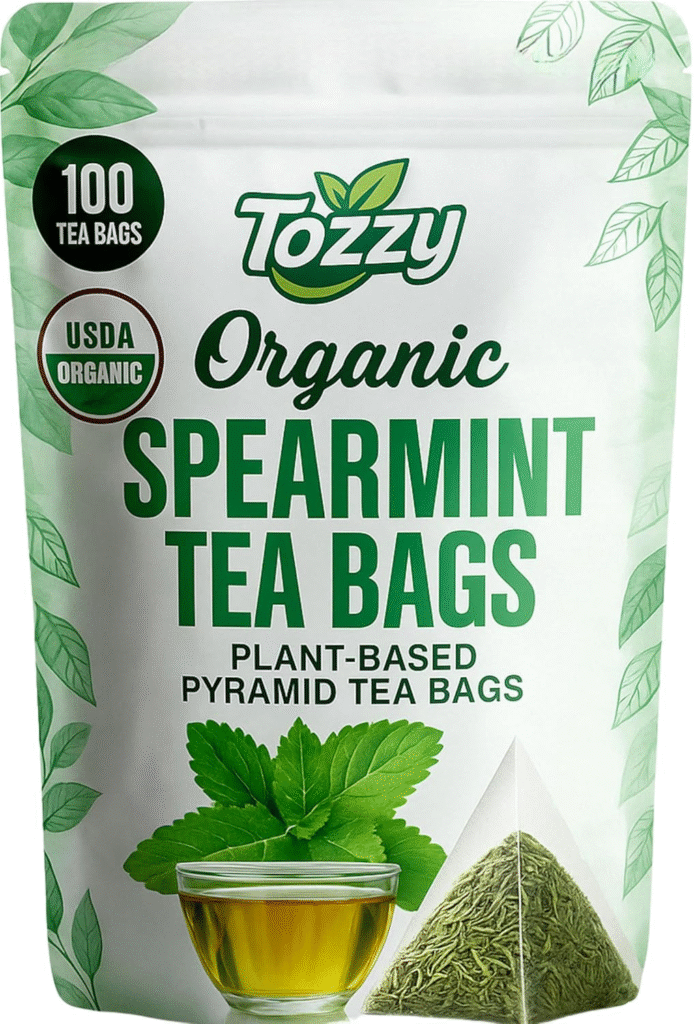
3. Chasteberry (Vitex)
Chasteberry, also known as Vitex, has been used for centuries to support women’s reproductive health. It works by influencing the pituitary gland, which plays a crucial role in hormone regulation.
For women with PCOS, chasteberry may help regulate menstrual cycles and improve fertility.
A systematic review published in the Journal of Alternative and Complementary Medicine found that chasteberry was effective in treating various menstrual disorders, including those associated with PCOS.
Using chasteberry:
- Take chasteberry supplements as directed (usually 1-2 capsules daily)
- Be patient, it can take several months to see the full effects
- Consider combining chasteberry with other PCOS-friendly herbs for synergistic effects
When using chasteberry, it’s important to be consistent and give it time to work. Many women report improvements in their menstrual regularity and overall hormonal balance after a few months of use.
>>Try this product from Amazon<<

4. Inositol
Inositol, particularly in its forms myo-inositol and D-chiro-inositol, has shown promising results in managing PCOS symptoms. These compounds play a role in insulin signaling and can help improve insulin sensitivity, regulate menstrual cycles, and support ovulation.
A meta-analysis published in Gynecological Endocrinology found that inositol supplementation significantly improved metabolic and hormonal parameters in women with PCOS, including insulin resistance, testosterone levels, and ovulation rates.
Incorporating inositol:
- Choose supplements containing both myo-inositol and D-chiro-inositol in a 40:1 ratio
- Start with a lower dose and gradually increase as tolerated
- Take inositol with meals for better absorption
Inositol is one of the most well-researched supplements for PCOS, and many women report significant improvements in their symptoms after consistent use. It’s particularly useful for those struggling with insulin resistance and irregular menstrual cycles.
https://amzn.to/4oxsmRz>>Try this product from Amazon<<
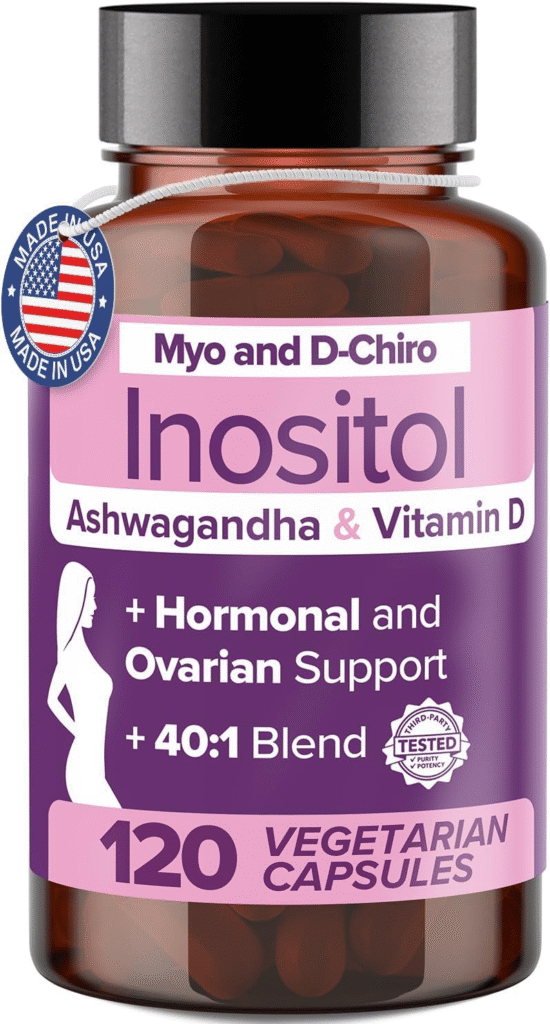
5. Saw Palmetto
For women struggling with hirsutism (excess hair growth) because of PCOS, saw palmetto may offer some relief. This herb is believed to block the conversion of testosterone to dihydrotestosterone (DHT), which is responsible for unwanted hair growth.
While research specifically on saw palmetto for PCOS is limited, studies on its effects in men with androgenic alopecia suggest it may have anti-androgenic properties that could benefit women with PCOS.
Using saw palmetto:
- Take saw palmetto supplements as directed (usually 160-320 mg daily)
- Be patient, it may take several months to notice significant improvements
- Consider combining saw palmetto with other anti-androgenic herbs for enhanced effects
Saw palmetto is generally well-tolerated, but as with any supplement, it’s important to ask with a healthcare provider before starting, especially if you’re taking other medications.
>>Try this product from Amazon<<

6. Licorice Root
Licorice root has been shown to have anti-androgenic properties, which can be useful for women with PCOS who are dealing with high testosterone levels. It may help reduce testosterone production and increase the body’s production of estrogen.
A study published in Steroids found that licorice root extract reduced serum testosterone levels in healthy women, suggesting its potential benefits for women with PCOS.
Incorporating licorice root:
- Take licorice root supplements as directed
- Drink licorice root tea (1-2 cups daily)
- Be cautious if you have high blood pressure, as licorice can increase blood pressure in some people
Licorice root can be a powerful ally in managing PCOS symptoms, but it’s important to use it carefully and under the guidance of a healthcare provider, especially if you have any pre-existing health conditions.
>>Try this product from Amazon<<
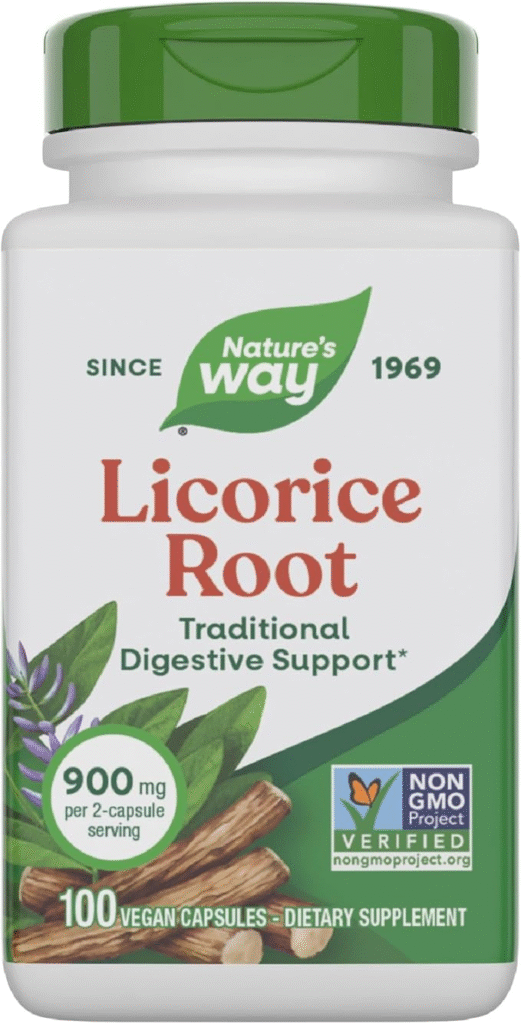
7. Green Tea
Green tea is renowned for its antioxidant properties and potential to boost metabolism. For women with PCOS who struggle with weight management, green tea can be a valuable addition to their daily routine.
It may help improve insulin sensitivity and promote fat oxidation.
A study published in the Journal of Nutritional Biochemistry found that green tea extract improved insulin sensitivity and glucose tolerance in rats with PCOS-like symptoms.
Enjoying green tea:
- Replace one of your daily coffee drinks with a cup of green tea
- Try different varieties of green tea to find your favorite flavor
- Consider green tea extract supplements for a more concentrated dose
Green tea supports PCOS management and offers a range of other health benefits, making it a great addition to any wellness routine.
>>Try this product from Amazon<<

8. Turmeric
Chronic inflammation is often associated with PCOS, and turmeric’s active compound, curcumin, is a potent anti-inflammatory agent. By reducing inflammation, turmeric may help reduce various PCOS symptoms and improve overall health.
A randomized controlled trial published in Phytotherapy Research found that curcumin supplementation significantly reduced inflammatory markers in women with PCOS.
Using turmeric:
- Add turmeric to your cooking (curries, soups, roasted vegetables)
- Make golden milk by mixing turmeric with warm milk and a pinch of black pepper
- Take curcumin supplements for a more concentrated dose
For better absorption, try pairing turmeric with black pepper, which enhances curcumin’s bioavailability. This powerful spice can be a flavorful and useful addition to your PCOS management plan.
>>Try this product from Amazon<<

9. Evening Primrose Oil
Many women with PCOS struggle with acne and other skin issues. Evening primrose oil, rich in gamma-linolenic acid (GLA), may help improve skin health and reduce inflammation.
Some women also report that it helps reduce breast pain and mood swings associated with hormonal fluctuations.
While research specifically on evening primrose oil for PCOS is limited, studies have shown its potential benefits for hormonal acne and premenstrual syndrome symptoms.
Incorporating evening primrose oil:
- Take evening primrose oil supplements as directed
- Start with a lower dose and gradually increase as tolerated
- Consider combining with other omega-3 fatty acids for enhanced benefits
Evening primrose oil is generally well-tolerated, but as with any supplement, it’s important to start with a lower dose and monitor your body’s response.
>>Try this product from Amazon<<
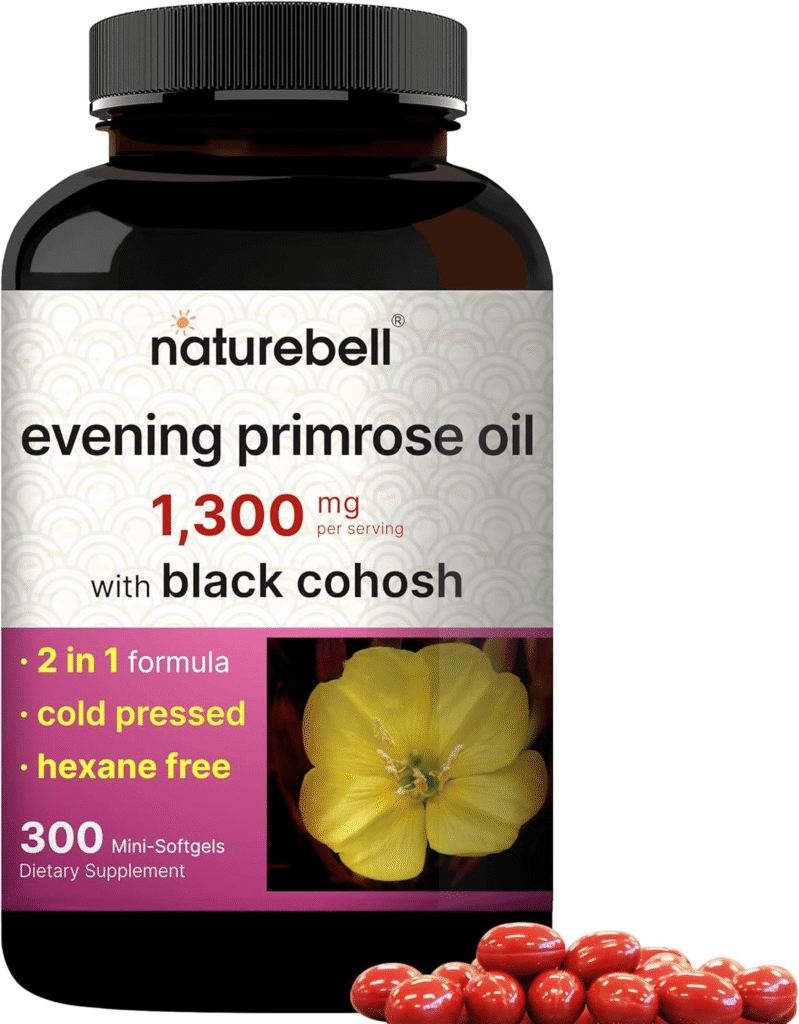
10. Ashwagandha
Stress can exacerbate PCOS symptoms, creating a vicious cycle. Ashwagandha, an adaptogenic herb, has been shown to help reduce stress and cortisol levels.
By managing stress, ashwagandha may indirectly help improve various PCOS symptoms.
A study published in the Journal of Evidence-Based Complementary & Alternative Medicine found that ashwagandha supplementation significantly reduced stress levels and improved quality of life in adults with chronic stress.
Using ashwagandha:
- Take ashwagandha supplements as directed (usually 300-500 mg daily)
- Try ashwagandha tea for a relaxing evening ritual
- Consider combining ashwagandha with other stress-reducing practices like meditation or yoga
Ashwagandha’s stress-reducing properties make it a valuable addition to any PCOS management plan, especially for those who find that stress triggers or worsens their symptoms.
>>Try this product from Amazon<<
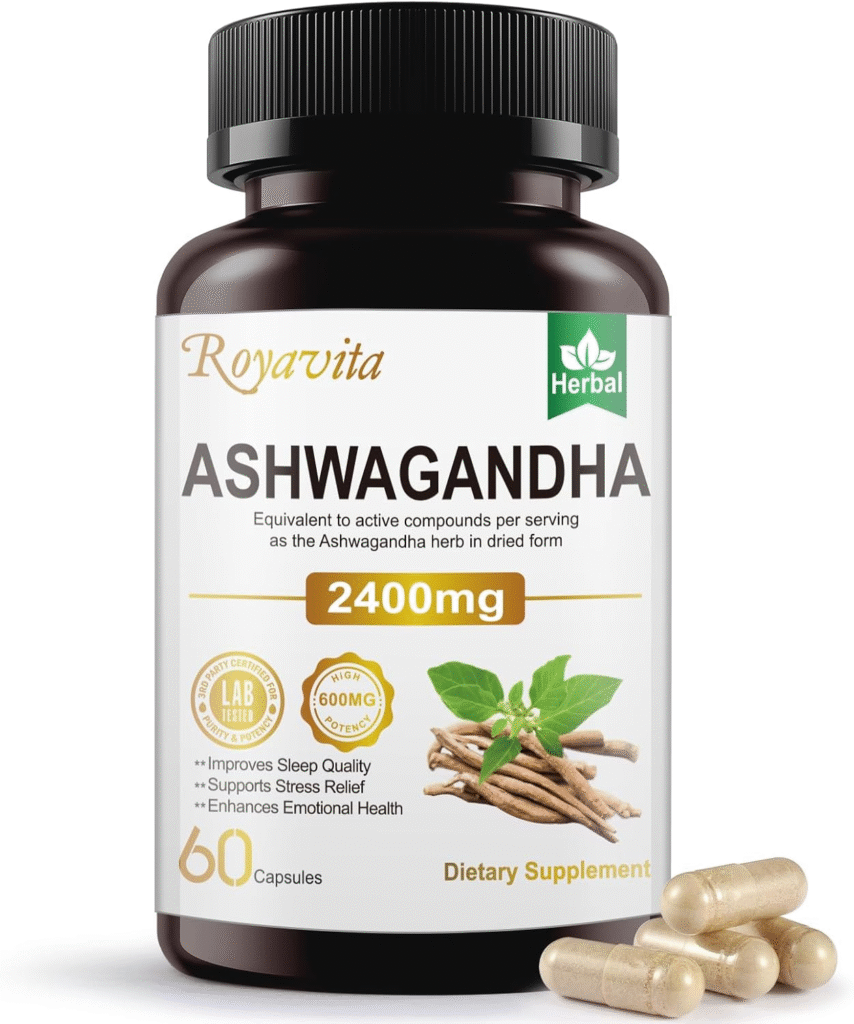
A Holistic Approach to PCOS Management
While these herbal supplements show promise in managing PCOS symptoms, they are not a magic cure. A holistic approach that includes a balanced diet, regular exercise, stress management, and proper sleep is crucial for effectively managing PCOS.
Always talk to a healthcare provider before starting any new supplement regimen, especially if you’re taking medications or have other health conditions. What works for one person may not work for another, so it may take some time and experimentation to find the right combination of supplements and lifestyle changes that work best for you.
By incorporating these herbal supplements into a comprehensive PCOS management plan, many women find relief from their symptoms and improved overall well-being. The path towards hormonal balance needs patience and persistence.
Celebrate the small victories along the way and remember that every positive change, no matter how small, is a step in the right direction.
Frequently Asked Questions
What is PCOS and what are its main symptoms?
PCOS (Polycystic Ovary Syndrome) is a hormonal disorder common among women of reproductive age. The main symptoms include irregular periods, excess androgen levels leading to acne and hirsutism, and polycystic ovaries.
Many women also experience weight gain, fertility issues, and insulin resistance.
Can herbal supplements cure PCOS?
Herbal supplements cannot cure PCOS, but they can help manage symptoms and improve overall well-being. They should be used as part of a comprehensive treatment plan that includes lifestyle changes and, if necessary, conventional medical treatments.
How long does it take to see results from herbal supplements for PCOS?
The time it takes to see results can vary depending on the person and the specific supplement. Some women may notice improvements within a few weeks, while for others, it may take several months of consistent use.
Are there any side effects of using herbal supplements for PCOS?
While herbal supplements are generally considered safe, they can have side effects and interact with medications. It’s important to ask with a healthcare provider before starting any new supplement regimen.
Can I take multiple herbal supplements for PCOS at the same time?
It’s possible to take multiple herbal supplements, but it’s important to do so under the guidance of a healthcare provider to confirm there are no harmful interactions and to decide the most effective combination for your person needs.
Is cinnamon effective for managing insulin resistance in PCOS?
Research suggests that cinnamon can help improve insulin sensitivity in women with PCOS. However, it should be used in conjunction with other lifestyle changes and treatments for best results.
How does spearmint tea help with PCOS symptoms?
Spearmint tea has been shown to have anti-androgenic effects, which means it may help reduce excess hair growth and improve hormonal profiles in women with PCOS.
Can inositol supplements improve fertility in women with PCOS?
Studies have shown that inositol supplements can help regulate menstrual cycles and improve ovulation in women with PCOS, potentially improving fertility. However, it’s important to work with a healthcare provider when addressing fertility concerns.
Are there any dietary changes that can help manage PCOS symptoms?
Yes, many women with PCOS benefit from a diet low in refined carbohydrates and high in fiber, lean protein, and healthy fats. Some find that following a low-glycemic index diet or anti-inflammatory diet helps manage their symptoms.
Can stress management techniques help with PCOS?
Yes, stress management techniques such as meditation, yoga, and regular exercise can help reduce stress levels, which may in turn help manage PCOS symptoms. Stress reduction is an important part of a holistic PCOS management plan.
Key Takeaways
- Herbal supplements can be a valuable addition to a comprehensive PCOS management plan.
- Cinnamon and inositol show promise in improving insulin sensitivity, a common issue in PCOS.
- Spearmint tea and saw palmetto may help manage excess hair growth and hormonal imbalances.
- Stress-reducing herbs like ashwagandha can indirectly help manage PCOS symptoms by lowering cortisol levels.
- A holistic approach combining herbal supplements, diet, exercise, and stress management is most effective for managing PCOS.
Disclaimer
The information contained in this post is for general information purposes only. The information is provided by Top 10 Herbal Supplements for Managing PCOS Symptoms and while we endeavor to keep the information up to date and correct, we make no representations or warranties of any kind, express or implied, about the completeness, accuracy, reliability, suitability or availability with respect to the website or the information, products, services, or related graphics contained on the post for any purpose.

